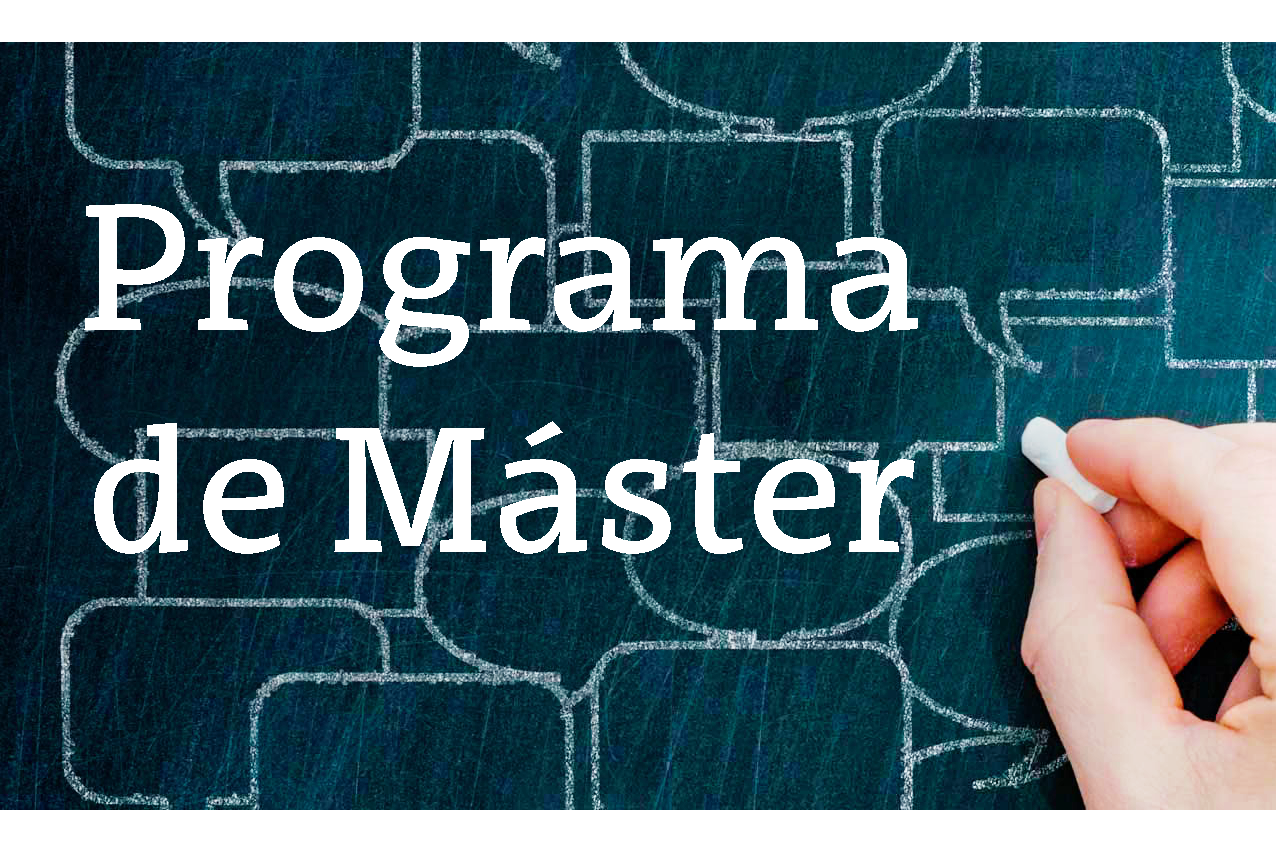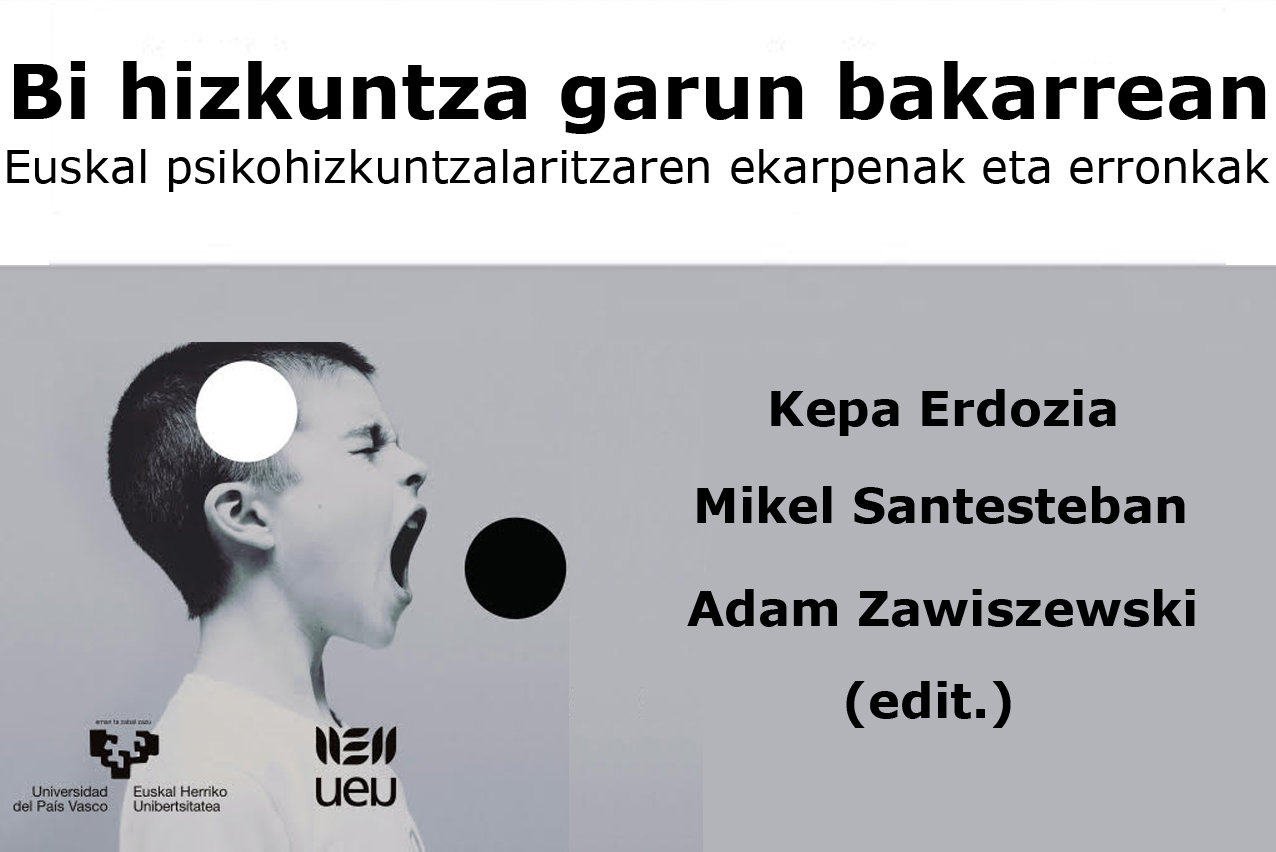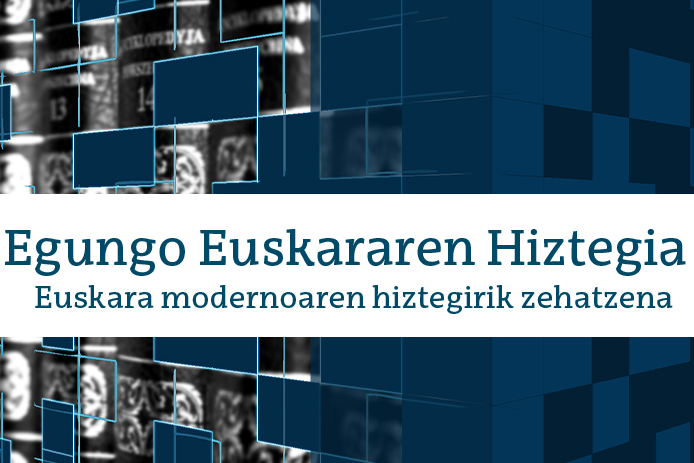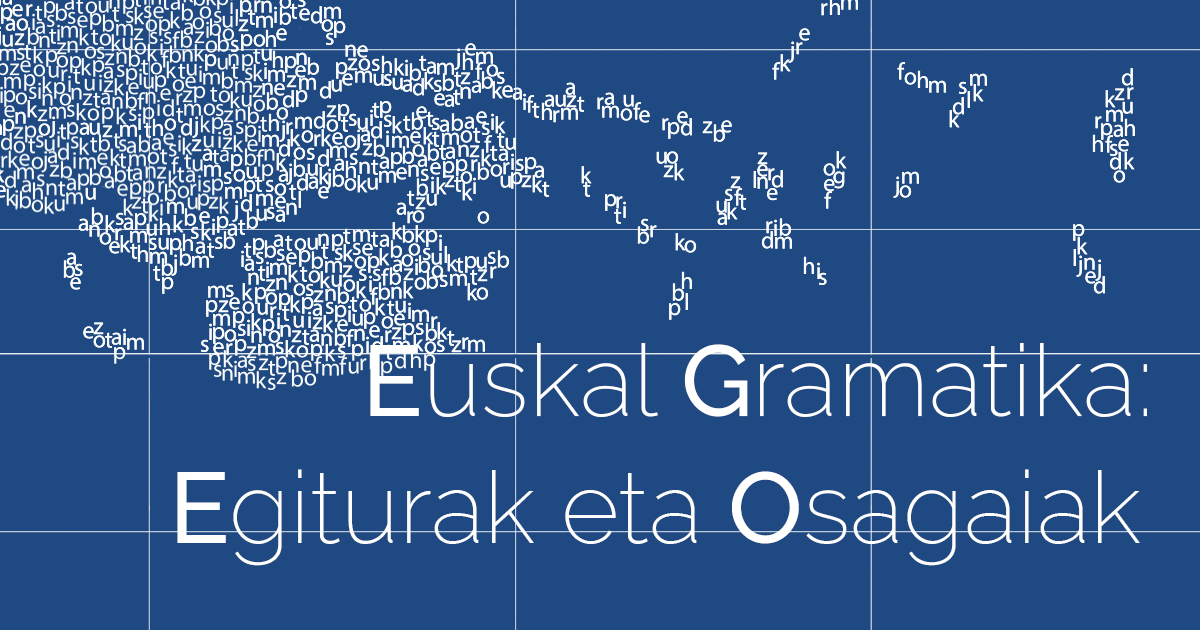 Lingüística y Estudios Vascos
Lingüística y Estudios Vascos
Facultad de Letras
Universidad del País Vasco (UPV/EHU)
itziar.laka@ehu.eus
A Brief Grammar of Euskara [download pdf]
Catedrática en el departamento de Lingüística y Estudios Vascos y directora del grupo de investigación La Mente Bilingüe en la Universidad del País Vasco (UPV/EHU). Se doctoró en 1990 en el MIT con la tesis Negation in Syntax: On the Nature of Functional Categories and Projections, (publicada por Garland en 1994), y fue profesora de Lingüística University of Rochester (New York) durante 1990-1995. Ha sido profesora invitada en las universidades de Viena, Utrecht, Nápoles y Río de Janeiro, e investigadora residente invitada en el Netherlands Institute for Advanced Study in Humanities (NIAS), y en el Instituto Universitario Ortega y Gasset (Madrid) entre otros. Académica de Jakiunde, Academia de las ciencias, de las Artes y de las Ciencias del País Vasco, y miembro correspondiente de Euskaltzaindia, Real Academia de la Lengua Vasca. Autora de A Brief Grammar of Euskara, the Basque Language (1996), de libre acceso en la red. Su investigación combina la lingüística teórica y metodología experimental de la psico/neurolingüística para el estudio de la representación y computación neural del lenguaje, centrada principalmente en torno a la sintaxis y el bilingüismo.
Perfil de citas google académico
PUBLICACIONES
De Pedis, M.; Zawiszewski, A.; Laka, I. (2025) The actress was not on the balcony: testing the Pseudorelative-First Hypothesis in Spanish. Frontiers in Psychology, Volume 16. https://doi.org/10.3389/fpsyg.2025.1546432
Isasi-Isasmendi, A.; Sauppe, S.; Andrews, C.; Laka, I,; Meyer, M. &Bickel, B. (2024) Incremental sentence processing is guided by a preference for agents: EEG evidence from Basque. Language, Cognition and Neuroscience, 39:1, p. 76-97.
Isasi-Isasmendi, A.; Sauppe, S.; Andrews, C.; Laka, I,; Meyer, M. &Bickel, B. (2023) The Agent Preference in Visual Event Apprehension. Open Mind. p. 1-43
Laka, I. (2023) Euskara Arrain Elektrikoen Itsasoan. Castro Egia, L. Mimenza Castillo (eds.) Euskal Hedabideen urtekaria 2022-2023. Bilbao, p. 43-48.
Gómez-Vidal B, Arantzeta M, Laka JP, Laka I (2022) Subjects are not all alike: Eye-tracking the agent preference in Spanish. PLoS ONE 17(8): e0272211. https://doi.org/10.1371/journal.pone.0272211
Zawiszewski, A., Martínez de la Hidalga, G., & Laka, I. (2022) Agents strongly preferred: ERP evidence from natives and non-natives processing intransitive sentences in Spanish. Brain Sciences 12 (7).
Egurtzegi, A.; Blasi, D.; Bornkessel-Schlesewsky, I.; Laka, I.; Meyer, M.; Bickel, B.; Sauppe, S. (2022) Cross-linguistic differences in case marking shape neural power dynamics and gaze behavior during sentence planning. Brain and Language. Volume 230. Doi: 10.1016/j.bandl.2022.105127
Laka, I. (2022) “Bilinguals and knowledge of language: a commentary to “Language Acquisition and Linguistic Theory” “ Applied Linguistics Review, vol. 13, no. 1, 2022, pp. 141-148. https://doi.org/10.1515/
Vela-Plo, L., Erdocia, K., Laka, I. (2022) Agents strongly preferred: Ambiguity processing in Basque. Papers on Basque Linguistics in Honour of Jon Franco. Deusto University Press, p. 167-194.
Mtz.de la Hidalga, G.; Zawiszewski, A. Laka, I. (2021) Going Native? Yes, If Allowed by Cross-Linguistic Similarity. Frontiers in Psychology-Language Sciences. doi: 10.3389/fpsyg.2021.742127.
Laka, I. (2021) Euskara eta elebitasuna, premiazko ezagutza. Bi hizkuntza garun bakarrean: euskal psikohizkuntzalaritzaren ekarpenak eta erronkak. Udako Euskal Unibertsitateak eta Euskal Herriko Unibertsitateak lankidetzan argitaratuta, p. 11 -14.
Zawiszewski, A.; Laka, I. (2020) Bilinguals processing noun morphology: Evidence for the Language Distance Hypothesis from event-related potentials. Journal of Neurolinguistics. Volume 55. DOI: 10.1016/j.jneuroling.2020.100908
De la Cruz-Pavía, I.; Elordieta, G.; Villegas, J.; Gervain, J.; Laka, I. (2020) Segmental information drives adult bilingual phrase segmentation preference. International Journal of Bilingual Education and Bilingualism. DOI: 10.1080/13670050.2020.1713045
 |
Laka Itziar (Arg.) (2019) Hitzak sarean: Pello Salabururi esker onez. Bilbo: EHU Argitalpen Zerbitzua, ISBN: 978-84-1319-111-9. |
Yetano, I.; Duñabeitia, J.A. & Laka, I. (2019) Processing Preferences in an Ergative Language: Evidence from Basque Postnominal Relative Clauses. Itziar Laka (Arg.) Hitzak Sarean, EHUko Argitalpen Zerbitzua,193-212
Yoza, N.; Erdocia, K. & Laka, I. (2019) Sentence processing in Andean and Peninsular Spanish: word order and animacy. Itziar Laka (Arg.) Hitzak Sarean, EHUko Argitalpen Zerbitzua, 213-239.
Martinez de la Hidalga, G.; Zawiszewski, A.; Laka, I. (2019). Eppur non si muove: experimental evidence for the Unaccusative Hypothesis and distinct ɸ-feature processing in Basque. Glossa: a Journal of General Linguistics, 4(1), 120. Doi: 10.5334/gjgl.829.
Arantzeta, M.; Howard, D.; Webster, J.; Laka, I. ;Martínez-Zabaleta, M.; Bastiaanse, R. (2019) Bilingual aphasia: assessing cross-linguistic asymmetries and bilingual advantage in sentence comprehension deficits. Cortex. Volume 119, October 2019, Pages 195-214.
Stepanov, A.; Andreetta, S.; Stateva, P.; Zawiszewski, A.; Laka, I. (2019) Anomaly detection in processing of complex syntax by early L2 learners. Second Language Research, pp. 1-27. DOI: 10.1177/0267658319827065
Erdocia, K.; Laka, I. (2018). Negative Transfer Effects on L2 Word Order Processing. Frontiers in Psychology-Language Sciences. doi: 10.3389/fpsyg.2018.00337
Arantzeta, M.; Webster, J.; Laka, I.; Martínez-Zabaleta, M.; Howard, D. (2018) What happens when they think they are right? Error awareness analysis of sentence comprehension deficits in apahasia. Aphasiology. DOI: 10.1080/02687038.2017.1423270
Laka, I. (2017) Bilinguals and knowledge of language. Applied Linguistics Review, DOI: 10.1515/applirev-2017-0096
Laka, I. (2017) La percepción del lenguaje y la eficiencia computacional. G. Ariel Schwartz y V.E. Bermúdez (Eds.) Nodos. Pamplona: Next Door Publishers, 285-287. #Nodes: Entangling Sciences and Humanities: Gustavo Ariel Schwartz, Víctor Bermúdez: 9781789380736: Amazon.com: Books
Arantzeta, M.; Bastiaanse, R.; Burchert, F.; Wieling, M.; Martinez-Zabaleta, M.; Laka, I. (2017) Eye-tracking the effect of word order in sentence comprehension in aphasia: Evidence from Basque, a free word order ergative language. Language, Cognition & Neurosciences. Volume 32, Issue 10. DOI: 10.1080/23273798.
Laka, I. (2017) Ergative Need not Split: An exploration into the TotalErg hypothesis. In Jessica Coon, Diane Massam, Lisa Travis (Eds.) The Oxford Handbook of Ergativity. New York: Oxford University Press, pages: 159-175.
Ordin, M.; Polyanskaya, L.; Laka, I.; Nespor, M. (2017) Cross-Linguistic Differences in the Use of Durational Cues for the Segmentation of a Novel Language. Memory & Cognition. doi:10.3758/s13421-017-0700-9
Santesteban, M.; Zawiszewski, A.; Erdocia, K.; Laka, I. (2017) On the Nature of Clitics and Their Sensitivity to Number Attraction Effects. Frontiers in Psychology.
Zawiszewski, A., Santesteban, M. and Laka, I (2016). Phi-features reloaded: An ERP study on person and number agreement processing. Applied Psycholinguistics, 37(3), pp. 601-626. DOI: 10.1017/S014271641500017
Díaz, B.; Erdocia, K.; de Menezes, RF.; Mueller, JL.; Sebastian-Galles, N. & Laka, I. (2016). Electrophysiological correlates of second-language syntactic processes are related to native and second language distance regardless of age of acquisition. Front. Psychol. 7:133. doi: 10.3389/fpsyg.2016.00133
Laka, I. (2015) Hacia la Neurosintaxis. In Ángel Gallego (Ed.) Perspectivas de sintaxis, Madrid: Akal, pp 699-719
Torrego, E.; Laka, I. (2015) The syntax of φ-features: Agreement with plural DPs in Basque and Spanish. In Fernández, B. & Salaburu, P. (Eds.). Ibon Sarasola, Gorazarre. Homenatge, Homenaje. Bilbao: UPV/EHU, pp.633-646.
Santesteban, M.; Pickering, M.J.; Laka, I.; Branigan, H.P. (2015). Effects of case-marking and head position on language production? Evidence from an ergative OV language. Language, Cognition and Neuroscience. Volume 30, pages: 1156-1174. DOI: 10.1080/23273798.2015.1065335
Ros, I.; Santesteban, M.; Fukumura, K.; Laka, I. (2015). Aiming at shorter dependencies: the role of agreement morphology. Language, Cognition and Neuroscience. DOI: 10.1080/23273798.2014.994009.
Laka I (2014) Gabriel Arestiren buruan: euskara ikasteaz eta elebitasunaz. In Harri eta Herri 50 urte. Forum Hitzaldiak 07, Bilbo: Bilbo Zaharra Liburuak, 26-39.
Acha, J.; Laka, I.; Landa, J.; Salaburu, P. (2014) EHME: A new word database for research in Basque language. The Spanish Journal of Psychology. Volume 17, E79. DOI: 10.1017/sjp.
Fratini, V.; Acha, J.; Laka, I. (2014) Frequency and morphological irregularity are independent variables: Evidence from a corpus study of Spanish verbs. Corpus Linguistics and Linguistic Theory. Volume 10, Issue 2, Pages 289–314, EISSN: 1613-7035, ISSN: 1613-7027, DOI: 10.1515/cllt-2013-0028.
De la Cruz-Pavía, I.; Elordieta, G.; Sebastián-Gallés, N.; Laka, I. (2014) On the role of frequency-based cues in the segmentation strategies of adult OV/VO bilinguals. International Journal of Bilingual Education and Bilingualism. Volume 18, Issue 2, pp. 225-241. DOI: 10.1080/13670050.2014.904839.
Erdocia, K.; Zawiszewski, A.; Laka I. (2014). Word order processing in a second language: from VO to OV. Journal of Psycholinguistic Research 43(6), 815-837. doi: 10.1007/s10936-013-9280-4.
| Sanz, M.; Laka, I.; Tanenhaus, M.K. (Eds.) (2013). Language Down the Garden Path: The Cognitive and Biological Bases for Linguistic Structure. Oxford University Presss, pp. 512. ISBN:978-0-19-967713-9. (Reviewed in Biolinguistics by Krivochen) |
Gervain, J.; Sebastian-Galles, N.: Diaz, B.; Laka, I.; Mazuka, R.; Yamane, N.; Nespor, M.; Mehler, J. (2013) Word Frequency Cues Word Order in Adults: Cross-Linguistic Evidence. Frontiers in Psychology. 4:689, ISSN: 1664-1078.
Sanz, M., Laka, I., Tanenhaus M. (2013). Sentence comprehension before and after 1970: topics, debates and techniques. In Sanz, M., Laka, I., Tanenhaus M. (Eds.) Language Down the Garden Path: The Cognitive and Biological Bases for Linguistic Structure, Oxford: Oxford University Press. ISBN:978-0-19-967713-9.
Pastor, L., Laka, I. (2013) Processing facilitation strategies in OV and VO languages: a corpus study. Open Journal of Modern Linguistics Vol.3, No.3, 252-258.
Laka, I. (2013). On language production principles and the form of language: a más cómo, menos por qué. Frontiers in Psychology (section Language Science). Volume 4, article 231.
Laka, I., Santesteban, M., Erdocia, K., & Zawiszewski, A. (2012) The Basque language in the minds of native and non-native bilinguals. In Pello Salaburu & Xabier Alberdi (Eds.) The Challenge of a Bilingual Society in the Basque Country. Current Research Series No. 9. Reno: University of Nevada. pp. 157-172. ISBN: 978-1-935709-30-5.
Laka, I. (2012). Merging from the temporal input: on subject-object asymmetries and an ergative language. In M. Piattelli-Palmarini & R. Berwick (eds.) Rich Languages from Poor Inputs, Oxford: Oxford University Press, pp. 127-145.
Erdocia K., Laka I., and Rodríguez-Fornells A. (2012) Processing verb medial word orders in a verb final language. In M. Lamers and P. de Swart (eds.), Case, Word Order and Prominence: Interacting Cues in Language Production and Comprehension, Studies in Theoretical Psycholinguistics 40, Dordrecht/Berlin:Springer. Volume 40, pp. 217-138.
Laka, I. (2012) More than one language in the brain. In Boeckx C., M.C. Horno & J.L. Mendívil (Eds.) Language, from a Biological Point of View: Current Issues in Biolinguistics. Cambridge: Cambridge Scholars Publishing, pp.184-207. ISBN: 1443837814.
Laka, I., & Erdocia, K. (2012). Linearization preferences given “free word order”; subject preferences given ergativity. A look at Basque. In E. Torrego (ed.). Of grammar, words, and verses: In honor of Carlos Piera, pp. 115.142, Oxford: Oxford University Press. ISBN: 9789027208255.
Laka, I. (2012). Accounting for Ergativity. In I. Laka and B. Fernández (eds.) Accounting for Ergativity. Special Issue of Lingua. Volume 122, Issue 3, 177-180. ISSN: 0024-3841.
Laka, I., Fernández. B. (eds). (2012). Accounting for ergativity. Special Issue of Lingua, 122 (3). ISSN: 0024-3841.
Amundarain, I., Garzia, J., Goenaga, P., Laka, I., Makazaga, J.M., Mujika, J.A., Oyharçabal, B., Rekalde, P., Salaburu, P. (2011). Euskal gramatika lehen urratsak VII: perpaus jokatugabeak[Gramática vasca VII: oraciones no finitas.] Euskaltzaindia-Real Academia de la Lengua Vasca, Bilbao: Elkar. ISBN: 978-84-95438-79-9.
Díaz B., Sebastián-Gallés N., Erdocia K., Mueller J.L., & Laka I. (2011). On the cross-linguistic validity of electrophysiological correlates of morphosyntactic processing: A study of case and agreement violations in Basque. Journal of Neurolinguistics, 24 (3), 357-373. ISSN: 0911-6044.
Laka, I., & Quer, J. (2011). La nada existencial y la nada universal. In M. V. Escandell-Vidal, M. Leonetti, & C. Sánchez López (eds.). 60 problemas de Gramática, pp. 229-234, Madrid: Akal AC.
Laka, I. (2011). Hizkuntza postpositiboa [Una lengua postpositiva] in Salaburu P., Goenaga, P., Sarasola I. (eds.) Sareko Euskal Gramatika [Gramática Vasca en Red] Euskara Institutua-Instituto del Euskara, UPV/EHU. ISBN: 978-84-693-9891-3.
Laka, I. (2011). Euskara eta gizakia: Hizkuntzaren prozesamendua [El euskera y el ser humano: el procesamiento de la lengua] in Salaburu P., Goenaga, P., Sarasola I. (eds.) Sareko Euskal Gramatika [Gramática Vasca en Red] Euskara Institutua-Instituto del Euskara, UPV/EHU. ISBN: 978-84-693-9891-3.
Zawiszewski A., Gutiérrez E., Fernández B., & Laka, I. (2011). Language distance and non-native syntactic processing: evidence from event-related potentials. Bilingualism: Language and Cognition, 14 (03), 400-411.
Acha, J., Laka, I., Perea, M. (2010). Reading development in agglutinative languages: Evidence with beginning, intermediate and adult Basque readers. Journal of Experimental Child Psychology, 105, 359-375. ISSN: 0022-0965.
Carreiras M., Duñabeitia J.A., Vergara M., de la Cruz-Pavia I., & Laka I. (2010). Subject Relative Clauses are not universally easier to process: Evidence from Basque. Cognition, 115, 79–92.
Colomé, A., Laka, I., & Sebastián-Gallés, N. (2010). Language effects in addition: How you say it counts. The Quarterly Journal of Experimental Psychology, 63 (5), 965-983.
Duñabeitia J. A. Dimitropoulou M., Uribe-Etxebarria O., Laka I., & Carreiras M. (2010). Electrophysiological correlates of the masked translation priming effect with highly proficient simultaneous bilinguals. Brain Research, 1359, 142-154.
Laka, I., Zawiszewski, A., & Erdocia, K. (2010). Euskal gramatika prozesatzen: hastapenetako zenbait emaitza [Processing Basque Grammar: some fundamental results]. in R. Etxepare, R. Gómez, & J. A., Lakarra. (Eds.). Beñat Oihartzabalen Omenez-A Festschrift for Bernard Oyharçabal, pp. 553-564, Bilbao: UPV/EHU Press.
Laka, I. (2010). Baieztapena eta ezeztapena. [Afirmación y Negación] in Salaburu P., Goenaga, P., Sarasola I. (eds.) Sareko Euskal Gramatika [Gramática Vasca en Red] Euskara Institutua-Instituto del Euskara, UPV/EHU. ISBN: 978-84-693-9891.
Duñabeitia J.A., Molinaro N., Laka I., Estévez A., & Carreiras M. (2009). N250 effects for letter transpositions depend on lexicality: Casual or causal? NeuroReport, 20 (4), 381-387.
Duñabeitia J.A., Laka, I. Perea, M., & Carreiras, M. (2009). Is Milkman a superhero like Batman? Constituent morphological priming in compound words. European Journal of Cognitive Psychology, 21 (4), 615-640.
Erdocia K., Laka I. Mestres A., Rodriguez-Fornells A. (2009). Syntactic complexity and ambiguity resolution in a free word order language: behavioral and electrophysiological evidences from Basque. Brain and Language, 109, 1-7
Laka, I. (2009). What is there in Universal Grammar? On innate and specific aspects of language. In M. Piattelli-Palmarini, J. Uriagereka, & P. Salaburu (Eds.) Of Minds and Language: A dialogue with Noam Chomsky in the Basque Country, pp.329-343, Oxford: Oxford University Press. ISBN:978-0-19-954466-0.
Laka, I. (2009). Rudolf P.G. de Rijk. Standard Basque, a progressive grammar. Language Problems and Language Planning, 33 (1), 98-99. ISSN 0272-2690, eISSN: 1569-9889.
Vergara-Martínez, M., Duñabeitia, J.A., Laka I., & Carreiras, M. (2009). ERP correlates of inhibitory and facilitative effects of constituent frequency in compound words. Brain Research, 1257, 53–64.
Zawiszewski, A., & Laka, I. (2009). Parameters of grammar and maturational effects: an ERP study on ergativity and object-verb agreement processing by native versus nonnative speakers of Basque. A supplement of the Journal of Cognitive Neuroscience, 122-123. ISSN: 0898-929X, eISSN: 1530-889.
Díaz, B., Sebastián-Gallés, N., Erdozia, K., Mueller, J. L., & Laka, I. (2008). Age of acquisition and proficiency on L2 syntactic processing. International Journal of Psychology, 43, 3-4, 91.
Garzia, J.; Laka I. (2008). Zioren zioak (eta hiru hitzaldi) [Las razones de ZIO (y tres conferencias)], en Jakin, Zientziaren dibulgazioa, 166, 11-16.
Laka, I. (2008). Hizkuntzaren sustrai biologikoen inguruan [On the biological basis of language], Ekaia: Euskal Herriko Unibertsitateko zientzi eta teknologi aldizkaria, 21 [Ekaia: Revista de ciencia y tecnología de la Universidad del País Vasco], 141-161.
Laka, I. (2008). Simetria ala simetria eza? Hitzordenaz hausnarrean. [¿Simetria o asimetria? Reflexiones sobre el orden de palabras] In X. Artiagoitia & A. Elordieta (Eds.) Antisimetriaren hipotesia vs buru parametroa: euskararen oinarrizko hitz hurrenkera ezbaian [La hipótesis de la Antisimetria vs. el parámetro de núcleo: el orden básico de palabras del euskera a debate] , pp. 199-219, Bilbao: UPV/EHU Press.
Laka,I. (2008). Senezkotasuna hizkuntzan. [Lo innato en el lenguaje]. In X. Artiagoitia & J. Lakarra (Eds.) Gramatika Jaietan. Patxi Goenagaren omenez [La fiesta de la Gramática: Homenaje a Patxi Goenaga] , pp. 433-450, Bilbao: UPV/EHU Press.
Laka, I. (2007). On innate and specific aspects of human language. In M. Aurnague, K. Korta, & J. M., Larrazabal (Eds.). Language, Representation and Reasoning , pp.229-248, Bilbao: UPV/EHU Press.
Laka, I. (2007). La desaparición de las lenguas del mundo (Reseña de Palabras y Mundos: informe sobre la diversidad lingüística). Revista Internacional de Estudios Vascos, 52 (1), 23.
Díaz, B., Erdocia, K., Mueller, J.L., Sebastian-Galles, N., & Laka, I. (2006). Individual differences in syntactic processing of a second language: Electrophysiological evidence. Journal of Psychophysiology, 20 (3), 228-228.
Ezeizabarrena, M. J., & Laka, I. (2006). Itzuleraren Hipotesiaz: haurren eta afasiko euskaldunen hizkuntza erkatzen. [Sobre la Hipótesis de la Regresión: lenguaje de niños y afásicos vascoparlantes]. In B. Fernández & I. Laka (Eds.). Andolin gogoan: essays in honour of Professor Eguzkitza ,pp. 367-382, Bilbao: UPV/EHU Press.
 |
Fernández, B., & Laka, I. (Eds.) (2006). Andolin gogoan: Essays in Honour of Professor Eguzkitza. Bilbao: Servicio Editorial de la UPV/EHU. ISBN:978-84-837-3890-0. |
Laka, I. (2006). On the nature of case in Basque: structural or inherent?. In H. Broekhuis, N. Corver, J. Koster, R. Huybregts, & U. Kleinhenz (Eds.). Organizing Grammar: Linguistic Studies in Honor of Henk van Riemsdijk , pp. 374-382, Berlin/New York: Mouton de Gruyter. ISBN: 3110188503 / 3-11-018850-3.
Laka I. (2006). Deriving Split-ergativity in the progressive: the case of Basque. In A. Johns, D. Massam, & J. Ndayiragije (Eds.). Ergativity: Emerging Issues , pp.173-195, Dordrecht/Berlin: Springer. ISBN:978-14-020-4186-0.
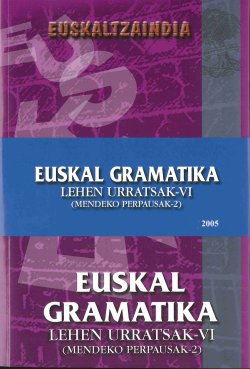 |
Altuna, P., Baraiazarra L., Eguzkitza A., Goenaga P., Makazaga J.M., Mujika, J.A., Oyharcabal, B., Rotaetxe, K., Salaburu, P., Amundarain, I., & Azkarate, M. (2005). Euskal Gramatika Lehen Urratsak VI [Gramática Vasca. Prolegómenos VI]. Euskaltzaindia, Gramatika Batzordea. Loiu: Elkar. |
Laka, I. (2003). Agramatismoaren sintomak euskaraz [Síntomas de agramatismo en euskera] in J.M. Makatzaga & B. Oyhartzabal (Eds.) IKER 14: Euskal gramatikari eta literaturari buruzko ikerketak XXI mendearen atarian [Investigaciones sobre literatura y gramática vasca en el inicio del siglo XXI], IKER (CNRS)-Euskaltzaindia (Real Academia de la Lengua Vasca), Bayona, Francia.
Laka, I. (2003). “Ari progresiboaz: euskararen kasu markak” en P. Albizu y B. Fernández (Eds.) Euskal Gramatika XXI. mendearen atarian: arazo zaharrak, azterbide beriak, [La gramática vasca a las puertas del siglo XXI: viejos problemas, nuevas propuestas] Bilbao: Servicio de Publicaciones de la UPV-EHU.
Laka, I. (2003). “Azkue gramatikagile” in M. Garamendi e I. Bazán (Eds.) Resurrección María de Azkue: euskal kulturaren erraldoia eta funtsezko zutabea Donostia-San Sebastián: Sociedad de Estudios Vascos.
Laka, I. (2002). Gramática Generativa y Lengua Vasca: estudios sobre ergatividad in Foro Hispánico: revista hispánica de Flandes y Holanda.
Laka, I. (2002). Ergatiboa definitzen: lehengo saioa gramatika sortzailean [Definiendo el ergativo: primer acercamiento en la gramática generativa] in X. Artiagoitia, P. Goenaga, J.A. Lakarra (Eds.) Erramu boneta: Festschrift for Rudolf P.G. de Rijk, UPV-ASJU, Bilbao.
Laka, I. (2002). Delimitando la Gramática Universal in N. Catalá, J. A. Díez y J.E: García-Albea (Eds.) El lenguaje y la mente humana, Ariel Practicum, Ariel, Barcelona. Pages: 77-119.
Laka I.; Erriondo-Korostola, L. (2002). Aphasia manifestations in Basque. Journal of Neurolinguistics. Volume: 14, Issues: 2-4. Pages:133-157.
Sanz, M.; Laka, I. (2002). Oraciones transitivas con se: el modo de acción en la sintaxis in Las construcciones con se, Cristina Sánchez (Ed.), Visor Libros.
Laka, I. (2000). Thetablind Case: Burzio´s Generalization and its image in the mirror. In: Eric Reuland (arg.) Arguments and Case. Explaining Burzio’s Generalization, Amsterdam/Philadelphia: John Benjamins Publishing Co. 113-129.
Laka, I. (1999). Review of The Syntax and Semantics of Conditional Clauses: Evidence from Spanish and Basque. GLOT International.
Laka, I. (1999). Ergatividad y predicados inacusativos. In J. Fernández González, C. Fernández, Juncal, M. Marcos Sánchez, E. Prieto de los Mozos, L. Santos Ríos (eds.) Lingüística para el siglo XXI. Ediciones Universidad de Salamanca.
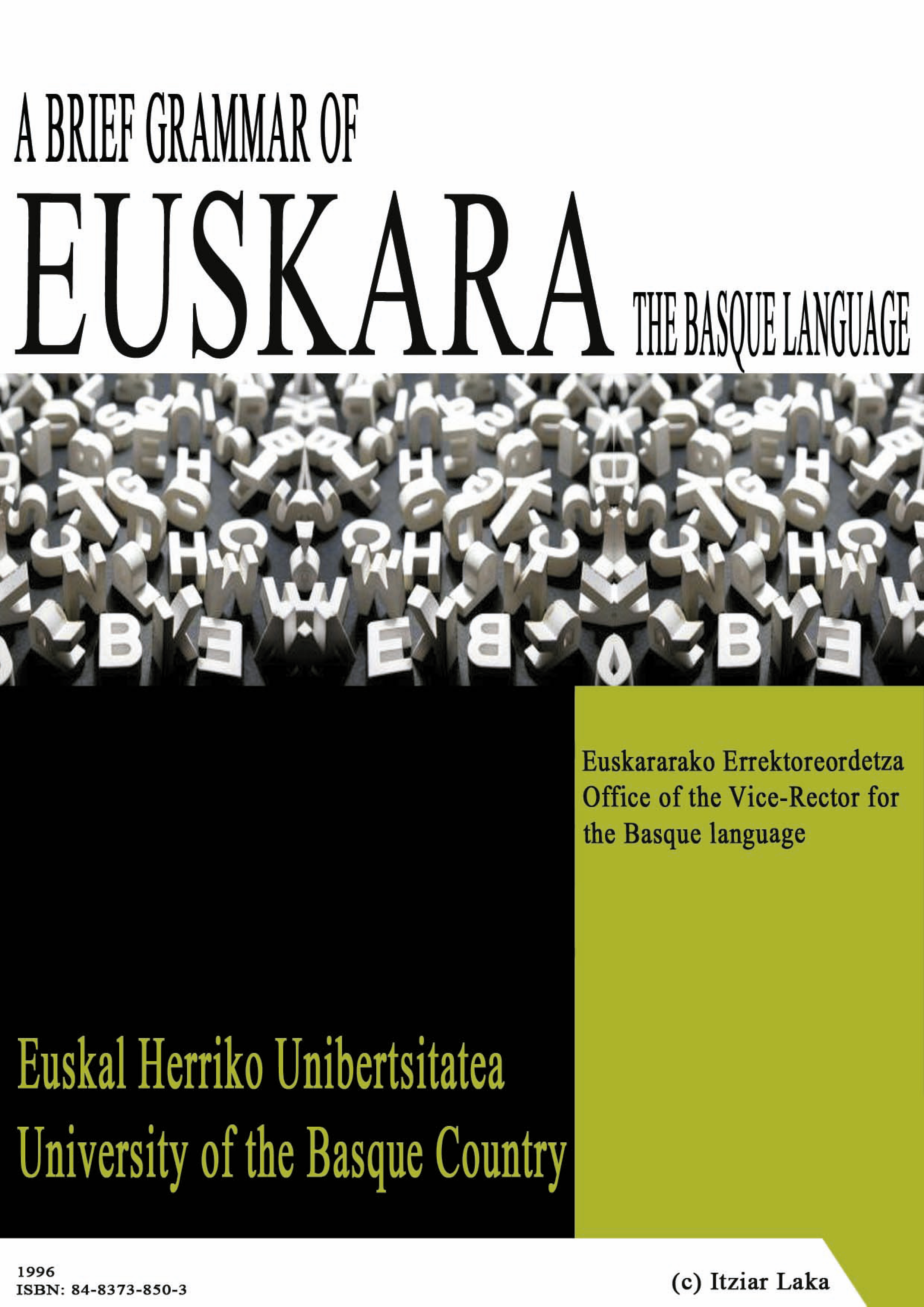 |
Laka, I. (1996). A Brief Grammar of Euskara, the Basque Language. Euskararako Errektoreordetza, EHU. ISBN: 84-8373-850-3. |
Laka, I. (1994). On the Syntax of Negation. Outstanding Dissertations in Linguistics Series, New York-London: Garland Publishing Co., ISBN 0-8153-1728-X.
Laka, I. (1993). Unergatives that Assign Ergative, Unaccusatives that assign accusative. In: J.D. Bobaljik eta C. Phillips (arg.) Papers on Case and Agreement I. MIT Working Papers in Lingusitics, Vol 14, Cambridge, Mass.,149-172.
Laka, I. (1993) The Structure of Inflection: A Case Study in X Syntax. In: J.I. Hualde eta J. Ortiz de Urbina (arg.) Generative Studies in Basque Linguistics, John Benjamins Publishing Co., Amsterdam/Philadelphia, 21-70.
Laka, I. (1990). Negation in Syntax: On the Nature of Functional Categories and Projections, Doctoral dissertation, MIT, Dept. of Linguistics and Philosophy.
(1989) Laka, I.; Mahajan, A. (Eds.) Functional Heads and Clause Structure. MIT Working Papers in Linguistics Vol. 10 MITWPL, Cambridge, Mass.
Laka I. (1988) Configurational Heads in Inflectional Morphology: the Structure of the Inflected Forms in Basque. In A.S.J.U., International Journal of Basque Linguistics and Philology, XXII-2, San Sebastián, pp. 343-366.
Laka, I. (1987). Abarrak. Kirikiño, Klasikoak, Vol. 6, Ediciones Mensajero, Bilbao. ISBN: 84-271-1472-9.
TRADUCCIONES LIBROS
(2009) “Hizkuntza eta Ikastea geroztik: Chomskyren eta Piageten arteko debateari buruzko gogoetak” , Bilbao: Pentsamenduaren Klasikoak, (Piattelli-Palmarini, M. “Ever Since Language and Learning: Afterthoughts on the Piaget-Chomsky Debate”, Cognition, 1994.) (Link)
(2009) Gogoaren elkartea, Bilbao: Pentsamenduaren Klasikoak, (Marvin Minsky The Society of Mind, 1985). ISBN: 978-84-96455-47-4 (Link)
(2003) Egitura Sintaktikoak. [ Syntactic Structures, Chomsky 1957) Hitzaurrea: Esther Torrego (UMassBoston), Bilbo: Klasikoak.
(1995) Hizkuntza [ Language, Bloomfield, 1933] Hitzaurrea: A. García Calvo (UCM), Bilbo: Klasikoak.
(1993) GB sintaxi ikastaro bat [ A Course in GB Syntax H. Lasnik eta J. Uriagereka, 1988], Bilbo: Euskal Herriko Unibertsitatearen Argitalpen Zerbitzuak.




